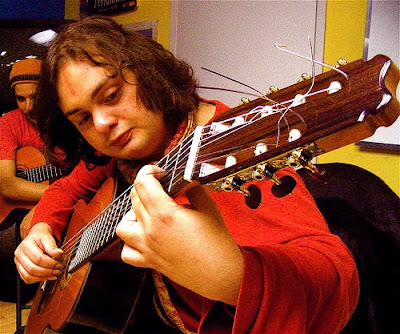
Thursday, June 3, 2010
Kiko Loureiro

Thursday, February 18, 2010
The Abreu Duo

 Sérgio Abreu interpreta Paganini e Sor (1981). Download CD here.
Sérgio Abreu interpreta Paganini e Sor (1981). Download CD here.Tuesday, December 29, 2009
Baden Powell

His powerful sound, personality, and technique, are unique and easy to identify. Some kind of magic leave a mark on his music, incorporating classical techniques together with many styles, including Samba, Bossa Nova, Choro, and Brazilian Folk Music.
He decided at age 19 to stop playing eletric guitar, and concentrate on the classical nylon guitar for the rest of his career (despite recorded a series of albums with a steel-string acoustic guitar).
From the album Tristeza On Guitar, released in 1966, standout tracks are a brilliant arrangement of "'Round Midnight" (Thelonious Monk), a beautiful version of the Black Orpheus' soundtrack "Manhã de Carnaval" (Luiz Bonfá) - watch video below - and his own composition "Canto de Ossanha".
On the 1967 album Poema On Guitar, special note to the tracks "Samba Triste", a interesting composition in partnership with a Brazilian singer and composer Billy Blanco, and Jerome Kern's "All the Things You Are".
Stands out in the album Canto On Guitar the beaultiful song "Samba em Prelúdio", which became a real hit in 70's with the lyrics written by the Brazilian diplomat and poet Vinicius de Morais.
On Images On Guitar, released in 1971, "Sentimentos" is the song to note. A track that exemplify Baden Powell's unmistakable style.

Download CD here. Liked the CD? Leave good reviews and buy it here
Rio das Valsas (1988), also released in 1993 under the name Seresta Brasileira, is an album with typical Brazilian waltzes, and his own compositions with the same style. Highlights are the version of "Rosa" (Pixinguinha) and "Chão de Estrelas" (Silvio Caldas).

Tuesday, September 29, 2009
Grupo D'Alma

The formation changed, but at different times included the musicians André Geraissaiti, Ulisses Rocha, Rui Saleme, Mozart Melo and Cândido Penteado.
The first album's title (A Quem Interessar Possa), released in 1979, could express their inner feelings about the art of composing with disregard for the commercial side of the trade. Special note to the tracks: "Song for my Friends", a Candido Penteado's beatiful composition, and "Blues para Charlie Mingus", another Candido Penteado's composition with an amazing solo in the pentatonic scale filled with blues notes.
In the second album, D'Alma, released in 1981, the jazz influence was more present than ever. Standout tracks are "Beije-me Garota" (Rui Saleme), "Tudo Certo" (Ulisses Rocha) and "Karate", composition from the great Brazilian guitarist and composer Egberto Gismonti.
 Grupo D'Alma. D'Alma (1981). Download CD here.
Grupo D'Alma. D'Alma (1981). Download CD here.Tuesday, September 15, 2009
Villa-Lobos

For guitar, the work of Villa-Lobos is a mandatory part of the repertory of any classical guitarist. The work is composed of "Choros", 5 Preludes and 12 Studies. The preludes and studies were composed in Paris, especially to be played by Andres Segovia, in the 20s. His work is a landmark of the aesthetics of the 20th century for classical music composed for the guitar.
Villa-Lobos was a lover of the guitar, had an irreverent personality and liked to invent tales about his life. For example, he used to say that he survived an attack by cannibals.

One of the biggest controversies of his guitar work is the possible existence of a sixth prelude, said to have been confirmed by Segovia. As some unpublished manuscripts have been found recently, we can only hope to find the sixth prelude.
In these videos, Andres Segovia, Julian Bream, David Russell and Ana Vidovic play four Villa-Lobos pieces in a great performance.
Among Brazilians, two standout interpreters of the work of Villa-Lobos are guitarists Turibio Santos and Fabio Zanon.

Wednesday, September 2, 2009
Yamandu

Welcome to Strings and Soccer Blog! Our first post is about the great guitarist Yamandu Costa. There are several qualities that are unique to him and his art, his technique, sensitibility and an incredible talent for improvisation. But what makes him really unique is the ability to interact with his audience. Wherever he plays is impossible to remain indifferent, the silence takes over the theater and the volume of the sound of his acoustic guitar seems to be stronger than any other sound.
Another great Brazilian guitarist, Fabio Zanon, has said that the way Yamandu interacts with the guitar look like it is fused as one, almost like a centaur, part man, part instrument.










